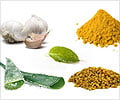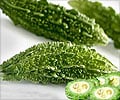- Coccinia Grandis - (https://en.wikipedia.org/wiki/Coccinia_grandis#cite_note-5)
- Munasinghe, M. A. A. K. et al. "Blood Sugar Lowering Effect of Coccinia Grandis (L.) J. Voigt: Path for a New Drug for Diabetes Mellitus." Experimental Diabetes Research 2011 (2011): 978762. PMC. Web. 29 June 2015.
- Skinner, Margot. Bioactives in Fruit Health Benefits and Functional Foods. Chichester, West Sussex, UK: Wiley Blackwell, 2013. Print.
- Poovendran, P., N. Vidhya, and S. Murugan. "Antimicrobial Activity of Coccinia Grandis Against Biofilm and ESBL Producing Uropathogenic E. Coli." Global Journal of Pharmacology 5.1 (2011): 23-26. IDOSI Publications. Web. 29 June 2015.
What is Ivy Gourd?
Ivy gourd is a tropical plant that belongs to the same family as the pumpkin and it goes by various names including baby watermelon, little gourd, gentleman#$#s toes and tindora. The plant is basically an aggressive climbing vine that spreads rapidly, covering large areas, even growing over other trees and vegetation. The growth of ivy gourd vines can be so dense as to block out sunlight and deprive other vegetation in the area of essential nutrients. While these features do make it somewhat of a threat to other forms of vegetation, this threat is greatly expounded by the rapid spread of the plant both vegetative and through seeds. This has led to its classification as an invasive weed in many parts of the world, such as in Hawaii, where it is a non-native species that now threatens native vegetation.
The plant, which is native to parts of Africa and Asia, including India, has been widely used as a medicinal herb. The leaves, root and stem are all used in the preparation of folk medicines. The leaves of the plant are heart or pentagon shaped and measure about five to ten centimeters in width and length. The large white flowers of the plant are aesthetically pleasing, which is why it is sometimes tolerated in gardens even when considered invasive.

What are the Health Benefits of Ivy Gourd?
While it would be a good idea to include ivy gourd in your diet, keep in mind that it may not help to address your health concerns as results can vary greatly.
Relief for Digestive Problems: According to some sources, including ivy gourd in your diet can help to relieve some digestive problems like constipation. This may be attributed to the moderate content of dietary fiber in ivy gourd. However, there are plenty of other natural sources of dietary fiber that are much richer and there is no documented evidence to support this claim.
Diabetes: Ivy gourd benefits for diabetics are frequently stressed in herbal medicine and clinical trials seem to support these claims. Some studies, like a double-blind phase I clinical trial conducted in Matara in August 2009 clearly showed that ivy gourd exercised a blood sugar lowering effect. Researchers believe that this beneficial effect of ivy gourd could be because of glucose-6-phosphatase inhibiting compounds present in the fruit. According to most practitioners of ayurvedic medicine and naturopathy, the consumption of ivy gourd leaf, ivy gourd juice and ivy gourd extract benefits diabetics too.

Allergy Protection: According to traditional medicine in India and Bangladesh, the fruit can also be used to treat certain respiratory conditions like asthma and bronchitis. This claim is now supported by some studies including one published in the Chinese Journal of Natural Medicines in 2011. The study found that there was a significant presence of saponin, steroids, alkaloids, flavonoids and glycosides in ivy gourd. The study was conducted on mice and researchers observed that the fruit extract had an anaphylactic and antihistaminic potential’ that could make it useful in the treatment of asthma and certain allergies.
Protection Against Cancer: In addition to its anti-diabetic and antihistaminic effects, some natural care enthusiasts also insist that the regular intake of ivy gourd can even help to prevent cancer. While there is no clinical evidence to support this claim, consuming ivy gourd may help to some extent as it is a rich source of antioxidants that help protect against free radical damage to cells and DNA. This could have an anti-mutagenic effect, which means that the risk of cell mutation is reduced.

Treats Infection: Traditionally, ivy gourd is attributed with a variety of health benefits and the leaf, roots and fruits of the plant have been used even in the treatment of conditions like leprosy and scabies. While alternative medicine abounds with baseless claims, some of these claims are in fact supported by evidence. Some researchers found that ivy gourd extract could work quite effectively as an antibiotic against certain common bacterial infections like E coli and other bacterial strains that can also cause urinary tract infections.
Ivy Gourd Recipes
Ivy Gourd Masala
Ingredients:
- Ivy gourd - 1/2kg
- Olive oil - 1 teaspoon
- Medium-sized onion - 1
- Big tomato - 1
- Chilli powder - 2 teaspoons
- Coriander powder - 1 heaped tablespoon
- Turmeric powder - 1 teaspoon
- Pepper powder - 1 teaspoon
- Mustard seeds - 1 teaspoon
- Cumin seeds - 1 teaspoon
- Curry leaves - 1 bunch
- Mint leaves - Handful
- Salt - a pinch
Preparation:
- Cut the ivy gourd, slicing each fruit lengthwise.
- Dice the onions and tomatoes finely.
- Chop the mint leaves as finely as possible.
- Heat oil in a nonstick pan and add the mustard and cumin seeds and curry leaves.
- Throw in the onions and tomatoes.
- After the onions and tomatoes have fried for a while add the sliced ivy gourd and all of the powders.
- Sprinkle salt for taste.
- Stir the mixture well and allow it to fry for at least ten minutes.
- Garnish with chopped mint leaves before serving.









